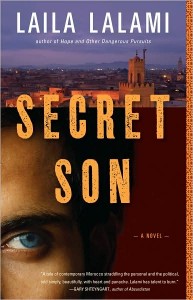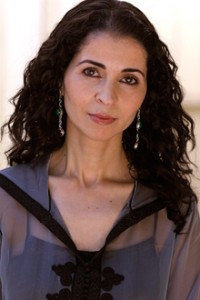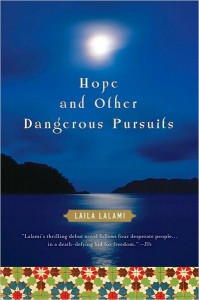 Few places are more evocative of mystery and the exotic than Casablanca. And anyone who has ever imagined its fragrances or color will recognize the setting of Laila Lalami’s second novel. But those who imagine Casablanca merely as a city of romance and North African charm may find themselves at a loss to reconcile the spices of their imagination with the brutal realities of poverty and the political and religious corruption Lalami portrays in Secret Son (Algonquin Books, April 2009).
Few places are more evocative of mystery and the exotic than Casablanca. And anyone who has ever imagined its fragrances or color will recognize the setting of Laila Lalami’s second novel. But those who imagine Casablanca merely as a city of romance and North African charm may find themselves at a loss to reconcile the spices of their imagination with the brutal realities of poverty and the political and religious corruption Lalami portrays in Secret Son (Algonquin Books, April 2009).
Set in modern-day Morocco, the novel concerns the coming-of-age of Youssef el-Mekki, a young man struggling to establish his identity and livelihood in the slum of Hay An Najat while seeking the father he long thought deceased. What he finds is more than a genealogical chart and what readers find is more than just a compelling story: Secret Son is a mirror in which our own modern age is reflected.
In the nascent years of the 21st century, in a neighborhood full of “merchants peddling their wares from rickety bicycles” and the “stink of old, refried sardines,” Youssef and his friends face the usual array of nineteen-year-old anxieties. They hang out nervously on street corners, smoke cigarettes, seek the attention of young women, and fret about admission to the university, which everyone — especially Youssef’s mother — believes is the ticket to success and freedom from their lot in the slums. Youssef escapes the pressures and grime of the neighborhood in the local movie theater until he must return to his own world “where heroes and villains could not be told apart by their looks or their accents.”
Much of the rest of his world, however, he finds easily distinguishable: the Mercedes-and-Marlboro crowd; the headscarf-and-beard faction; the Marx-and-Lenin group; the Berbers and Saharawi. Youssef watches the different cliques at school wondering how he could “know, as easily as everyone else did, which group was his.” The cliques and clans all seem a common part of youthful angst, akin to America’s Freaks and Geeks. But this is not Middle America: The challenges of youthful self-identification and justice in Morocco don’t play out at the local mall or in suburban basements. And to choose one side or the other results in far more than mere temporary gain or loss of social status.

Laila Lalami / photo copyright: Laila Lalami
In addition to these universal anxieties of looming adulthood, the boys of Hay An Najat — and elsewhere in the Islamic world, the author seems to suggest — face the compounded pressures of class and poverty, conditions from which escape is as much a dream as Brad Pitt’s pretty face projected in 10-foot scale. Enter the Party, an Islamic fringe group that soon takes over the Star Cinema as its “Oasis” headquarters in Hay An Najat, and begins handing out “tents, blankets, [and] sacks of flour” and building a soccer field where once there was trash. As in other parts of the Arab world, the local “Party” serves a civic purpose, closing the gap between the people and their needs by offering extensive social and community services that the official government does not. Like Hamas in Palestine or the Taliban in Afghanistan, the organization makes their presence indispensable to the neighborhood residents, providing a stabilizing infrastructure that over time may result in loyalty to the Party.
Hatim, the leader of the Party, and its followers, the Partisans, begin to quietly woo Youssef and his friends with the kind of power and recognition they cannot attain elsewhere in society. When Youssef is injured in a university protest, he finds himself the lead story in a Party-published paper, the story told slant despite Hatim’s comforting reassurances. “Don’t worry, my son,” he says, an endearment bestowed upon all the young men of Hay An Najat, the secret sons of the Party.
Lalami’s authorial position on the role of the Party is subtle and sympathetic, neither demonizing Hatim nor patronizing Maati and the other young followers he inculcates with his anti-government diatribes. Lalami’s ability to walk this line is made easier because she paints the neighborhood’s desperation so clearly, beginning with the flood that opens the novel, forcing people into the street to save their meager belongings and introducing the empty promises of government officials. She shows that the government is negligent and there are real needs to be met, needs that in reality may be met by the Party. Couple this with the impressionable young male characters, who dart after power like fish after a flashing lure, and we begin to understand the allure of the Party despite our better instincts, as do many of the characters themselves. Lalami wants readers to understand how forces like the Party take hold within a community and how seeming altruism turns to ideological vengeance and violence.
Against this backdrop, Youssef seeks out his biological father, whom his mother has kept secret. Through a chance encounter, Youssef discovers that his father is a wealthy business leader in Casablanca with roots in left-leaning politics. Nabil Amrani at first embraces Youssef as the son he never had and installs him in a posh apartment, grants him a job at one of his hotels, and promises Youssef a future he thought he would never have. Amal, Nabil’s daughter only 6 months older than Youssef, is a secondary character with immense narrative clout. She serves as a provoking counterpart to Youssef, equally torn between an indescribable loyalty to her privileged past and family and a yearning to craft a future on her terms — not those of her father or her country. Youssef’s loyalty and yearning for independence takes on a wholly different form.
Youssef abandons his home in Hay An Najat and lives the high life for months, dreaming of a boundless future and watching his father. In a lovely, long passage, we see Nabil through the eyes of Youssef, examining him as one would examine a stranger from another world. Youssef observes “ . . . He never took a nap after lunch. The cigarettes he smoked were red Dunhills. Whenever he commented on an article in the newspaper, which was often, he used words like déontologiquement. . .he stared at beautiful women . . .he never went to mosque . . . ” We learn as much about Nabil as Youssef does, but begin to suspect what Youssef does not. Blinded by his father’s luxurious lifestyle — to which Youssef now has access — and mesmerized by the habits, mannerisms, and convictions of his newly-found father as only a son can be, Youssef cannot see his father’s essential and deeply flawed character. As Youssef fully embraces his flashy new lifestyle, we begin to more closely watch the narrative unfold, looking for what feels like inevitable disappointment.
After a series of life-changing rejections, Youssef is forced back to Hay An Najat. Bitter rejection soon turns to angry revenge for Youssef and his friends, left behind in the slums while he flourished, and Lalami’s plot and complex characters ripen into something more powerful than one might first imagine. Through Lalami’s restrained but powerful description, we gain an almost palpable knowledge of Youssef’s burgeoning anger, knowledge essential to understanding the future events of the novel. By stepping beyond even the third person and adopting a more universal authorial voice in the following passage, Lalami offers a clearer sense of Youssef’s emotional trajectory. She writes:
His anger took many shapes: sometimes it was soft and familiar, like a round stone that he had caressed for so long that it was perfectly smooth and polished; sometimes it was thin and sharp, like a blade that could slice through anything; sometimes it had the form of a star, radiating his hatred in all directions, leaving him numb and empty inside.
Lalami vacillates between a third person omniscient narrator and this even more expansive narrative voice to offer a greater perspective on her characters and the societal positions they maintain. In another example of her narrative ventriloquism, Lalami deliberately retells several scenes from different perspectives. Although it sounds like a trick plucked from Fiction 101, in her narrative, the effect is not heavy-handed or amateurish. She gets away with what could be a gimmick in part because the narrative does not depend on the technique to reveal essential information about plot and because she does not rely on obvious duplications of scene or dialogue. Furthermore, the scenes do not appear in back-to back chapters or side-by-side in some hackneyed attempt at technique, but rather are spaced unexpectedly between other scenes with up to 30 pages between them.
In one of several such scenes, we witness the initial dinner between Nabil and Youssef, first from the perspective of Nabil and then from Youssef. The third person point of view is still distant enough to allow a reader to enter the scene and sympathize with the character, as well.
From Nabil’s perspective:
Youssef cut a small piece of crayfish and examined it carefully before placing it in his mouth.
“Do you like seafood?”
“I’m not sure,” Youssef said looking up, his eyebrows knitted in a quizzical frown.
Nabil’s thoughts wondered helplessly to Amal.
And then pages later from Youssef’s point of view:
When his plate of crayfish arrived, he stared at it, unsure where to start. He managed to slice off an edible piece; he made a mess of it.
“Do you like seafood?” Nabil asked.
Perhaps I cut the crayfish the wrong way, Youssef thought. He felt his cheeks redden. “I’m not sure, “ he said frowning.
We see Nabil, selfishly distracted by thoughts of his daughter, while Youssef wants only to please him and to fit in to this foreign society. In another key scene, Nabil’s daughter Amal visits Rachida, Nabil’s former lover and Youseff’s mother. The scene is played first through the eyes of Rachida and then, in what seems to be weeks later, the scene appears again through the perspective of Amal. The effects of these alternating points of view illustrate not only the individual character’s unique perspective but also the comparable perspectives from both sides of the class divide. The result is an empathetic position most fiction writers seek but fewer attain.
Through Lalami’s subtle execution, we see each character struggling with similar questions of identity, justice, and loyalty, whether in a mansion or a whitewashed shack: Nabil, longing for his estranged daughter while talking to his heretofore unknown son, and Rachida, mourning her own lost innocence through Amal’s own blamelessness. By crafting such parallels within her narrative, Lalami encourages readers’ compassion while illuminating the complex roles each character plays in society and, even more pointedly, in Muslim society. Each is, in some way, a victim or a pawn, an actor or a liar, a son or a daughter, a mother or a father.
In Secret Son, Lalami slips behind the headlines of terrorism into a real world occupied by men and women of all social strata who have sought their dreams and no matter their income or stature, have found those dreams unattainable and beyond reach.
The story of Secret Son is ultimately, too, the bold articulation of something that most readers will have heard over and over since Sept. 11 — how young men in far-off places are being lured into a life of Islamic fundamentalism, for whom jihad and the dismantling of Western culture is believed to be the key to freedom. Secret Son shows readers the path a young man can follow to an inadvertent life in the world of terror, in which joining the Party and sipping tea in the Headquarters is only the first of many initiations for a young man such as Youssef. Through Lalami’s story, readers tread in the footsteps of a young man on that path, see the turns and the crossroads, and feel the weight of his changing world as he moves along the course.
Further Resources
 – Via the New York Times, here is the first chapter of Secret Son.
– Via the New York Times, here is the first chapter of Secret Son.
– On the author’s website, you can read an excerpt from Lalami’s debut novel, Hope and Other Dangerous Pursuits.
– Lalami’s website also includes links to her essays, short stories, book reviews, and other writings.
– Here is a Powell’s interview with Lalami (conducted by Dave Weich).
– Read “Inventing the Past,” which was adapted from a conversation moderated by Colum McCann and featuring Arthur Japin, Laila Lalami, Imma Monsó, and 2007 PEN World Voices Festival.
– Listen to Laila Lalami talk about her new book on The Bat Segundo Show.
– Here is a link to two videos featured on Laila Lalami’s website. In the first one she reads from her first novel, Hope and Other Dangerous Pursuits, as part of the Authors@Google series, in Santa Monica, CA, on March 19, 2008. The second shows Lalami discussing what makes good writing, in a short video produced by the University of California Riverside, where she is an Assistant Professor of Creative Writing.
– In this video (via YouTube), Lalami discusses Secret Son:
– And here, also via YouTube, is the book preview for Secret Son:





